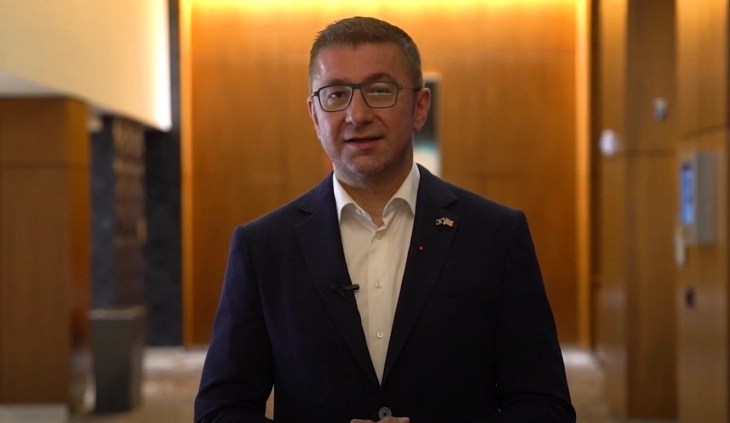Prime Minister Hristijan Mickoski stated that no meeting was arranged with Greek Prime Minister Kyriakos Mitsotakis at the NATO Summit in Washington, though he was open to discussions with anyone.
“Our schedules must not have aligned,” Mickoski explained during a Sitel TV interview on Tuesday evening.
When asked if there had been any attempts to arrange a meeting, he confirmed there had been none.
“No, there were none. We were often in the same rooms and sometimes just 50-100 meters apart, but there was never a necessity for such a meeting. If there ever is, I am ready to talk with anyone,” Mickoski said.
He added, “It seems our southern neighbor’s prime minister was too busy. I suppose he couldn’t find the time to meet with me.”
Mickoski declined to provide details about the meetings at the summit, saying, “I cannot disclose what was said or how it was said, but I can emphasize that the Alliance is united and unanimous in all decisions made and publicly available.”
Regarding the claim that Mitsotakis pressured him to use the constitutional name, Mickoski said he could not confirm any “forcing” but mentioned he felt comfortable during the discussions.
Mickoski noted he had delivered three speeches, which he believed added value to the NATO summit and attracted attention from the participants.
On his meeting with Bulgaria’s caretaker Prime Minister Dimitar Glavchev, Mickoski described their relations as “relaxed and coordinated.” He acknowledged that the countries, as partners in a common structure, had differing viewpoints on some issues.
“This is not a problem. I have my arguments, and I assume they have theirs. I am ready to debate and discuss these issues, present my arguments, and listen to theirs,” Mickoski said, expressing doubt about unblocking the country’s EU path while Bulgaria was led by a caretaker government.
He mentioned having a phone conversation with caretaker PM Glavchev a few days earlier to coordinate efforts to combat a fire affecting both sides of the border, which they had managed to control.
When asked about the possibility of starting EU negotiations during the Hungarian presidency, Mickoski affirmed the government’s readiness to talk.
“We are ready to talk. We have our position, and I cannot accept the idea of changing the Constitution to include several hundred citizens who identify as part of the Bulgarian community. Why should we do that?” Mickoski questioned.
He labeled the inclusion of constitutional amendments in the Negotiating Framework as an ultimatum. “So, if it’s in the Framework, I should accept it? That’s not right,” Mickoski said.
He also referenced 14 European Court of Human Rights judgments regarding the Macedonian community in Bulgaria, whose rights, he said, were partially or completely denied.
photo by MIA





Comments are closed for this post.